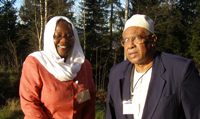|
|
|
|
 |
|
Africa Muslim Environment Network FAQ
Our Vision:
African Muslims helping African Muslims helping the Earth
Who are We?
The Africa Muslim Environment Network (AMEN) was formed in 2006 after several leading Muslims in Africa expressed the need for their communities to address the two critical issues of poverty and environmental degradation in Africa.
We are a network of Muslims and Muslim Organisations in Kenya, Zambia, Tanzania, Zimbabwe and South Africa – with hopes to expand much further over the next ten years. This is the first time that different African Muslim groups have ever linked together on these issues on this scale.
What do we do?
 |
 |
 |
Maimuna Mwidau and Mohammed Hyder: discussing the issues around a Muslim Environment Network in Africa. |
Our primary purpose is to share information about successful environment friendly development initiatives by Mosques, Islamic organisations (such as youth groups and women groups) and the diversity of Islam communities around Africa. We will also share information about the environment and development from secular organisations and those undertaken by other faiths.
One of our first projects, for example, will involve working with Muslim fishermen along the Kenyan coast, encouraging them to bring back traditional Swahili fish trapping, and helping them to sell these ecologically-harvested fish to hotels and tourist resorts.
Plans are also being developed for sustainable organic production of honey in Zambia, where the marketing would be done by women, giving them a degree of financial independence and qualifying the honey as a fair trade-style product.
In the future our aim is to assist further relationships with - and between - Muslim communities across the continent, as well as establishing contacts with secular groups, and facilitating a better understanding of different Muslim communities, in their own countries and outside.
Why are we needed?
Traditionally Muslim populations are among the poorest in Africa, and it has sometimes been hard for African Muslims to see what positive changes can make to reverse this perniciously persistent situation. Our vision is that in the future, Muslims will feel increasingly empowered to act within our communities to address the issues that are critical to our continent and our future.
Who funds us?
Our initial funding has come from the World Bank through ARC. We are currently seeking further funding in order to continue.
Who can be a member?
Membership is open to all Mosques and Muslim organisations in Sub-Sahara Africa.
What is our formal objective?
Our objective is to restore the traditional role of the Mosque as the Ummah centre for spiritual, social and economic fulfilment, and our intention and to do by assisting community development through sustainable use of the environment.
We want to do this because we believe that this is the way forward for our Muslim communities in Africa to take action and responsibility for their future, and the earth’s future.
How can you contact us:
Secretary General,
Africa Muslim Environment Network.
P.O.Box 5274-00506
Nairobi.
Phone/fax: +254-020-603305/ 602021.
Or email us via info@arcworld.org and mark the subject line "please forward to AMEN"
Our Seven pledges are:
1. To pay full attention to the need for a balance in the contributions of men and women in any plans or projects coming from AMEN.
2. To assist in the design and implementation of environmental and development projects focusing on the Mosque.
3. To provide a forum for Muslims to share information through publications and websites – either our own, or from organizations with similar objectives.
4. To compile and share a database on Muslim initiatives on environment and poverty issues.
5. To prioritise projects that involve community participation at every stage.
6. To liaise with government agencies and other relevant bodies such as NGOs, CBOs, etc. to make positive changes within the Muslim community
7. To solicit for funds and accept grants, gifts, subscriptions and other forms of assistance for the realization of the objectives.
|
 |
|
|
|
|
|

